Hero (Zhang Yimou, 2002)
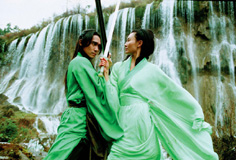 Obviously
this year’s Chinese mega-production of Zhang Yimou’s epic wu xia Hero
arrives to a great deal of anticipation. Its $30 million production budget is
one of the highest in that country’s history, its cast reads like a virtual
who’s who of local talent (Jet Li, Tony Leung, Maggie Cheung, and Zhang Ziyi,
each playing an assassin, are in the four lead roles), and co-financier
Miramax’s involvement ensures that it’s properly poised for another Crouching
Tiger, Hidden Dragon-style crossover in the US, if such a phenomenon is even
repeatable. It’s fortunate, then, that the film finds Zhang stirring from the
relative slumber of his last few features (Happy Times, The Road Home,
Not One Less) and delivering what might well be the most crowd-pleasing
spectacle of his career to date.
Obviously
this year’s Chinese mega-production of Zhang Yimou’s epic wu xia Hero
arrives to a great deal of anticipation. Its $30 million production budget is
one of the highest in that country’s history, its cast reads like a virtual
who’s who of local talent (Jet Li, Tony Leung, Maggie Cheung, and Zhang Ziyi,
each playing an assassin, are in the four lead roles), and co-financier
Miramax’s involvement ensures that it’s properly poised for another Crouching
Tiger, Hidden Dragon-style crossover in the US, if such a phenomenon is even
repeatable. It’s fortunate, then, that the film finds Zhang stirring from the
relative slumber of his last few features (Happy Times, The Road Home,
Not One Less) and delivering what might well be the most crowd-pleasing
spectacle of his career to date.
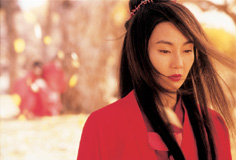 Set
loosely in a historical context in pre-unified China, Hero takes a
folkloric approach in telling its tale of political espionage and cultural
homogenization. Opening titles alert us that the tale we’re about to see is
just one of the many that chronicle the attempts to assassinate Emperor Ying
Zheng (Chen Daoming), who would go on to become the first emperor of the unified
nation. We’re immediately introduced to the Nameless (Jet Li), a master
swordsman who arrives at the Emperor’s fortress after vanquishing three deadly
assassins who had beleaguered him for years. In a conversation that will become
the movie’s framing device, the Nameless explains to the Emperor how he has
accomplished a task that armies numbering in the thousands could not.
Set
loosely in a historical context in pre-unified China, Hero takes a
folkloric approach in telling its tale of political espionage and cultural
homogenization. Opening titles alert us that the tale we’re about to see is
just one of the many that chronicle the attempts to assassinate Emperor Ying
Zheng (Chen Daoming), who would go on to become the first emperor of the unified
nation. We’re immediately introduced to the Nameless (Jet Li), a master
swordsman who arrives at the Emperor’s fortress after vanquishing three deadly
assassins who had beleaguered him for years. In a conversation that will become
the movie’s framing device, the Nameless explains to the Emperor how he has
accomplished a task that armies numbering in the thousands could not.
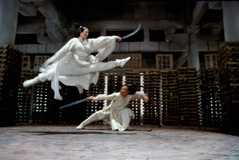 Zhang
almost explicitly acknowledges this framing device’s stodginess, opting to
shoot all of the duo’s conversations in a decidedly non-flashy shot /
counter-shot style. As the film proceeds non-chronologically, launching into
flashback after flashback from this starting point, half-truths, rampant
speculation, and outright lies are brought to light, and events begin to
overwrite one another as the definitive truth is gradually revealed.
Structurally, it’s almost as if the film is a morally simplified retelling of
Kurosawa’s Rashomon, spruced up by martial arts sequences. Still,
plotting, clever as it is here, seems one of Zhang’s minor concerns telling
this story. Aesthetic thrills seem more significant than narrative ones in Hero,
and there’s little denying that the picture, which is home to the finest
production values ever seen in a Chinese-language movie, is a compositional
masterpiece. Cinematographers Christopher Doyle and Hou Yong are to be commended
for outdoing even Crouching Tiger, Hidden Dragon (surely the
bellwether of quality when judging these films) visually. Thanks to the fine
cinematography, art direction, and costuming, Hero is the best-looking
film from any country since Wong Kar-Wai’s In the Mood For Love, which
was incidentally shot by Doyle along with the phenomenal Mark Lee Ping-bin. The
director seems thrilled here by the scale that he’s working with, and never
misses an opportunity to flaunt scope or symmetry in his compositions (perhaps
most impressively in a sequence in which an army totaling 3,000 fires arrows at
a tiny keep simultaneously). Every shot is so achingly beautiful that it almost
distracts from the relatively straightforward genre picture that’s playing out
behind them.
Zhang
almost explicitly acknowledges this framing device’s stodginess, opting to
shoot all of the duo’s conversations in a decidedly non-flashy shot /
counter-shot style. As the film proceeds non-chronologically, launching into
flashback after flashback from this starting point, half-truths, rampant
speculation, and outright lies are brought to light, and events begin to
overwrite one another as the definitive truth is gradually revealed.
Structurally, it’s almost as if the film is a morally simplified retelling of
Kurosawa’s Rashomon, spruced up by martial arts sequences. Still,
plotting, clever as it is here, seems one of Zhang’s minor concerns telling
this story. Aesthetic thrills seem more significant than narrative ones in Hero,
and there’s little denying that the picture, which is home to the finest
production values ever seen in a Chinese-language movie, is a compositional
masterpiece. Cinematographers Christopher Doyle and Hou Yong are to be commended
for outdoing even Crouching Tiger, Hidden Dragon (surely the
bellwether of quality when judging these films) visually. Thanks to the fine
cinematography, art direction, and costuming, Hero is the best-looking
film from any country since Wong Kar-Wai’s In the Mood For Love, which
was incidentally shot by Doyle along with the phenomenal Mark Lee Ping-bin. The
director seems thrilled here by the scale that he’s working with, and never
misses an opportunity to flaunt scope or symmetry in his compositions (perhaps
most impressively in a sequence in which an army totaling 3,000 fires arrows at
a tiny keep simultaneously). Every shot is so achingly beautiful that it almost
distracts from the relatively straightforward genre picture that’s playing out
behind them.
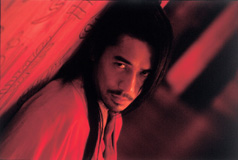 It’s
almost impossible not to notice that Hero’s plot has been cobbled
together so that each of its four lead characters have an opportunity to square
off against one another in one-on-one armed combat. Only one possible
permutation of possible match-ups among the four principals goes unexploited as
the film plays out, but for fans of Asian cinema, that’s far from a bad thing.
The CGI-enhanced wire-fu athletics that dominate the match-ups even more
brazenly defy physics than in CTHD (one scene features dueling swordsmen
propelling themselves repeatedly above a placid lake by dipping merely the tips
of their blades in), but it’s clear that the still-impressive choreography is
after an even more stylized effect than Lee’s film was. If the artier fight
scenes in Hero are sometimes briefly less than thrilling, they’re never
for a moment less than visually ravishing. Every battle has a different, bold
look to it, but the clear highlight among the fight sequences is a beautiful
face-off set during an autumnal blanket of yellow leaves. With only the blue sky
and the red outfits of the combatants occasionally peeking through the swirling
foliage, the palette of the film is reduced to primary colors, to stunning
effect. The main complaint when considering these sequences (which comprise the
vast percentage of the film’s running time) has to be that Zhang occasionally
overdoses on slow-motion effects. They’re so frequent at times that it seems
as if the entire film was filmed at double speed and slowed down. Still, it
seems almost ridiculous to complain that images as glorious as the ones in Hero
linger as long as they do.
It’s
almost impossible not to notice that Hero’s plot has been cobbled
together so that each of its four lead characters have an opportunity to square
off against one another in one-on-one armed combat. Only one possible
permutation of possible match-ups among the four principals goes unexploited as
the film plays out, but for fans of Asian cinema, that’s far from a bad thing.
The CGI-enhanced wire-fu athletics that dominate the match-ups even more
brazenly defy physics than in CTHD (one scene features dueling swordsmen
propelling themselves repeatedly above a placid lake by dipping merely the tips
of their blades in), but it’s clear that the still-impressive choreography is
after an even more stylized effect than Lee’s film was. If the artier fight
scenes in Hero are sometimes briefly less than thrilling, they’re never
for a moment less than visually ravishing. Every battle has a different, bold
look to it, but the clear highlight among the fight sequences is a beautiful
face-off set during an autumnal blanket of yellow leaves. With only the blue sky
and the red outfits of the combatants occasionally peeking through the swirling
foliage, the palette of the film is reduced to primary colors, to stunning
effect. The main complaint when considering these sequences (which comprise the
vast percentage of the film’s running time) has to be that Zhang occasionally
overdoses on slow-motion effects. They’re so frequent at times that it seems
as if the entire film was filmed at double speed and slowed down. Still, it
seems almost ridiculous to complain that images as glorious as the ones in Hero
linger as long as they do.
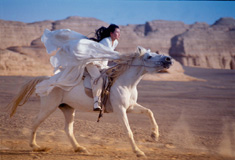 One
could also gripe that the almost humorless Hero doesn’t quite take us
along on the ride that Ang Lee’s film did in its fight scenes. Nothing here
has quite the same kinetic propulsion that the rooftop dash did in CTHD,
but few action scenes in all of filmdom have. The editing and camera setups seem
more distanced from the action here, lending a more contemplative, painterly
feel (only extended by the slow-motion) that extends to the dramatic scenes that
frame the martial arts sequences. The overall presentation of Hero is so
tastefully restrained that a tiny rivulet of blood is all that ever flows after
a fighter is mortally wounded. Similarly, when a character breaks down to cry, a
single tear is all that’s shed. Initially, such control seems excessive, but
by the time the end of the film rolls along, and major characters have died time
and again, it becomes apparent that Zhang’s restraint is precisely what keeps
the film’s tone from veering into the melodramatic.
One
could also gripe that the almost humorless Hero doesn’t quite take us
along on the ride that Ang Lee’s film did in its fight scenes. Nothing here
has quite the same kinetic propulsion that the rooftop dash did in CTHD,
but few action scenes in all of filmdom have. The editing and camera setups seem
more distanced from the action here, lending a more contemplative, painterly
feel (only extended by the slow-motion) that extends to the dramatic scenes that
frame the martial arts sequences. The overall presentation of Hero is so
tastefully restrained that a tiny rivulet of blood is all that ever flows after
a fighter is mortally wounded. Similarly, when a character breaks down to cry, a
single tear is all that’s shed. Initially, such control seems excessive, but
by the time the end of the film rolls along, and major characters have died time
and again, it becomes apparent that Zhang’s restraint is precisely what keeps
the film’s tone from veering into the melodramatic.
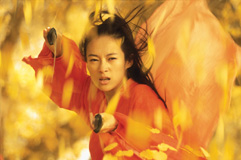 Certainly,
the top-notch cast doesn’t hurt when keeping Hero’s emotions honest,
though. An early scene, in which the four leads are thrown together for the
first time, feels exhilarating because of the sheer amount of star power
radiating from the screen. Each actor is given a glowing, graceful star
treatment of a caliber that’s rarely been seen since Hollywood’s studio
days, and each imbues their somewhat thinly written character with an intangible
history thanks to their built up persona. All around, performances are solid,
with top nods going to Tony Leung and Maggie Cheung, who predictably bring a
smoldering intensity to their roles as compatriots in love and war. The
political concerns of the film seem almost simple-minded until it parallels them
with the ebb and flow in this duo’s relationship. Because we feel they care
about each other so intensely, when their politics threaten that relationship,
they suddenly become immediate. If Hero can’t quite attain the
emotional heft of CTHD or Wong Kar-Wai’s Ashes of Time, or allow
for a monologue as remarkable as Maggie Cheung’s was in the latter film,
it’s far from a shallow effort on dramatic grounds. When the floodgates open
in the final moments of the film, and Zhang’s self-control gives way to a
sobering admission of reality, Hero achieves an undeniably poignant
wallop.
Certainly,
the top-notch cast doesn’t hurt when keeping Hero’s emotions honest,
though. An early scene, in which the four leads are thrown together for the
first time, feels exhilarating because of the sheer amount of star power
radiating from the screen. Each actor is given a glowing, graceful star
treatment of a caliber that’s rarely been seen since Hollywood’s studio
days, and each imbues their somewhat thinly written character with an intangible
history thanks to their built up persona. All around, performances are solid,
with top nods going to Tony Leung and Maggie Cheung, who predictably bring a
smoldering intensity to their roles as compatriots in love and war. The
political concerns of the film seem almost simple-minded until it parallels them
with the ebb and flow in this duo’s relationship. Because we feel they care
about each other so intensely, when their politics threaten that relationship,
they suddenly become immediate. If Hero can’t quite attain the
emotional heft of CTHD or Wong Kar-Wai’s Ashes of Time, or allow
for a monologue as remarkable as Maggie Cheung’s was in the latter film,
it’s far from a shallow effort on dramatic grounds. When the floodgates open
in the final moments of the film, and Zhang’s self-control gives way to a
sobering admission of reality, Hero achieves an undeniably poignant
wallop.
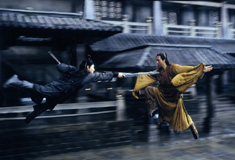 Like
most mega-productions, Hero feels somewhat streamlined and to an American
viewer, it doesn’t exactly seem to take mammoth creative risks (though a $30
million foreign film made with American audiences in mind seems to be one in
itself). The gray morality of its action heroes might be a bit tougher for
Chinese audiences to swallow, however, since the film never delivers anything so
simple (or fun) as a bad guy. It’s almost impossible ascertain who the titular
“hero” is meant to be, since no character’s stance comes without serious
ethical compromises. The central political concern of the film (Will the
progress prompting, war ending benefits of a sole Chinese Emperor outweigh the
cultural homogenization that it will inevitably bring?) offers no easy answer,
and the film is much richer as a result. Short-term peace would come at the cost
of the future nation’s long-term progress, and vice versa. Instead of
reinventing this genre though, Zhang opts to dazzle his audience with his
assemblage of technical and aesthetic wonders, and the considerable sum of the
efforts makes the film a top-notch entry in its field, even if it’s more often
mind-blowingly lush than spine-tinglingly thrilling. For those who were
unimpressed by Crouching Tiger, Hidden Dragon, it’s doubtful that Hero
will be able to convert them into advocates of to this type of film. For those
who were caught up in Lee’s level of artistry and sophistication, however, a
similar achievement awaits in Zhang Yimou’s Hero.
Like
most mega-productions, Hero feels somewhat streamlined and to an American
viewer, it doesn’t exactly seem to take mammoth creative risks (though a $30
million foreign film made with American audiences in mind seems to be one in
itself). The gray morality of its action heroes might be a bit tougher for
Chinese audiences to swallow, however, since the film never delivers anything so
simple (or fun) as a bad guy. It’s almost impossible ascertain who the titular
“hero” is meant to be, since no character’s stance comes without serious
ethical compromises. The central political concern of the film (Will the
progress prompting, war ending benefits of a sole Chinese Emperor outweigh the
cultural homogenization that it will inevitably bring?) offers no easy answer,
and the film is much richer as a result. Short-term peace would come at the cost
of the future nation’s long-term progress, and vice versa. Instead of
reinventing this genre though, Zhang opts to dazzle his audience with his
assemblage of technical and aesthetic wonders, and the considerable sum of the
efforts makes the film a top-notch entry in its field, even if it’s more often
mind-blowingly lush than spine-tinglingly thrilling. For those who were
unimpressed by Crouching Tiger, Hidden Dragon, it’s doubtful that Hero
will be able to convert them into advocates of to this type of film. For those
who were caught up in Lee’s level of artistry and sophistication, however, a
similar achievement awaits in Zhang Yimou’s Hero.
* * * *
12-26-02
Jeremy Heilman